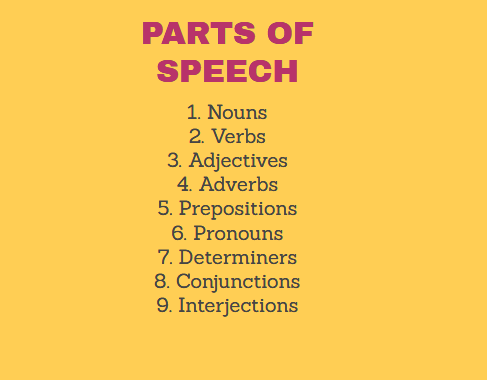What is ‘part of speech’?
‘Part of speech’ is a formal term used to state what particular type of word a specific word is.
There are 9 different ‘parts of speech’ or categories which any word could belong to.
The 9 categories are:
- Noun
- Verb
- Adjective
- Adverb
- Preposition
- Pronoun
- Determiner
- Conjunction
- Interjection.
Let us look at each of these and then go through some examples.
NOUN
A noun is a word which is a name. It could be the name of a person like “Martin”, or it could be the name of a place like “New York”.
It can also be the name of an animal, food, building and many other things. So words like ‘tiger’ , ‘pizza’ , ‘school’ are nouns as they are names of a specific animal, food and building respectively.
It can even be the name of something abstract i.e. something which we cannot touch or see e.g. ‘love’ or ‘peace’.
VERB
A verb is an action. So ‘go’, ‘see’, ‘drink’, ‘eat’ are all verbs.
Verbs in English come in 4 different forms which are: 1. the infinitive (original form) 2. past simple, 3 present participle and 4. the past participle.
So GO/WENT/GOING/GONE are the infinitive, past simple, present participle and past participle forms of the verb ‘TO GO’.
ADJECTIVE
An adjective describes a noun.
For example there is a house near my school. We can say “There is a house near our school”. But we know nothing about the house. To provide some information or description about it we can add an adjective, “There is a big house near our school.” The more adjectives, the more information we have about the noun being described.
Writers often use a lot of adjectives to describe things to make their readers be able to imagine or visualise things more vividly in their books.
So for example we can say:
‘There is a big house near our school.”
but if we say
“There is a big and beautiful house near our school”
We know that not only is the house big but it is also beautiful.
Here is another example.
“John was a tall, well-built, intelligent, talkative but sometimes indecisive man.”
In this one sentence we have five adjectives which are: ‘tall’, ‘well-built’, ‘intelligent’, ‘talkative’ and ‘indecisive.
ADVERB
An adjective describes a noun but an adverb describes a verb, the clue is in the word ‘adverb‘.
For instance we can say “John drives”, but do we know how he drives?
We can use adverbs.
“John drives quickly.”
“John drives slowly.”
“John drives dangerously.”
Adverbs often end in ‘-ly’ like ‘quickly’, ‘slowly’, ‘carefully’ but not always. For example ‘well’ is an adverb. ‘He cooks’. How does he cook? Is his cooking good or bad, so we can say ‘He cooks well’. We don’t say ‘He cooks good’, because good is an adjective and adjectives describe a noun not a verb.
PREPOSITION
A preposition is often about direction and location. Examples of prepositions are words like ‘to’, ‘in’, ‘on’, ‘for’ and so on.
A preposition comes before a noun and shows how something is related to that noun.
It links two nouns together.
For example: “John comes from Australia.”
‘From’ comes before the noun ‘Australia’ and tells us that is where John comes from.
The nouns ‘John’ and ‘Australia’ are linked by the preposition ‘from’.
PRONOUN
A pronoun replaces a noun.
So we could say “John is clever and John likes football”, but it would be normal to replace the second ‘John’ in the sentence with the pronoun, ‘he’.
So ‘John is clever and he likes football.’ is the more usual, common way of saying this sentences.
Pronouns include words like: I, we, you, he, she, it, they and also me, us, you, him, her, it and them.
DETERMINER
A determiner often tells us about how many of something there are.
Determiners include: The & a or an
They also include ‘some’, ‘many’ or a number for instance, ‘There is a teacher in the room but there are six students.’
The words ‘a’ as in ‘a teacher’ and ‘six’ students are the determiners in that sentence.
CONJUNCTION
A conjunction is a word that joins two parts of a sentence like ‘and’, ‘or’ , ‘because’.
We could say “Peter likes fruit. He also likes vegetables”, however we can make this one sentence with the conjunction ‘and’.
“Peter likes fruit and he also likes vegetables.”
INTERJECTION
An interjection is a word which expresses emotion for instance surprise or shock. It is usually one word and includes words like
‘wow’, ‘really!’ ‘oh!’ and so on.


